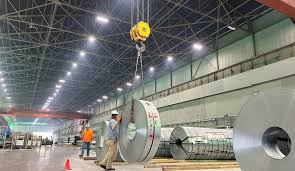The automotive sector in India is facing a pivotal moment as two key industry bodies—Automotive Component Manufacturers Association of India (ACMA) and Society of Indian Automobile Manufacturers (SIAM)—have urged the Ministry of Steel and the Ministry of Heavy Industries to reconsider restrictions on specific steel imports. This appeal highlights growing concerns about disruptions in automobile production due to the stringent measures.
Concerns Over Steel Import Restrictions
India’s finished steel imports hit a seven-year high of 5.7 million metric tonnes during April-October, prompting the government to consider imposing safeguard duties. Speaking at a press conference, Vinnie Mehta, Director General of ACMA, pointed out that automotive steel imports make up a mere 5% of total steel imports and often involve highly specialized grades imported in small quantities.
“The government has implemented several Quality Control Orders (QCOs) to encourage localization, which ACMA fully supports. However, the process now requires importers to obtain a No Objection Certificate (NOC) for specific steel grades. Unfortunately, the issuance of these NOCs has slowed down, putting the automotive industry’s production schedules at risk,” Mehta explained.
Challenges for the Automotive Industry
Both ACMA and SIAM have expressed their concerns in formal representations to the ministries, hoping for a resolution. “Inventory levels have dropped so low that some manufacturers are at risk of halting production. While we fully endorse localization, certain technologies are so niche that domestic manufacturing is not viable,” Mehta emphasized.
Growth Amid Challenges
Despite these challenges, the Indian automotive components industry has shown resilience. In the first half of the current financial year, the sector reported an 11.3% year-on-year growth, reaching ₹3.32 trillion. This growth comes even as major carmakers face a downturn in volume sales.
Mehta attributed this success to the continued demand for SUVs and premium two-wheelers. Additionally, exports of automotive components grew by 7% year-on-year to $11.1 billion, with significant markets in the US and Europe. Imports also saw a modest 4% increase, reaching approximately $11 billion.
Outlook for the Future
The collaboration between ACMA and SIAM reflects the industry’s commitment to balancing localization goals with the immediate need for specialized materials. With ongoing discussions and a shared minister overseeing the portfolios, stakeholders remain cautiously optimistic about a favorable resolution to the steel import restrictions.






Leave a Reply